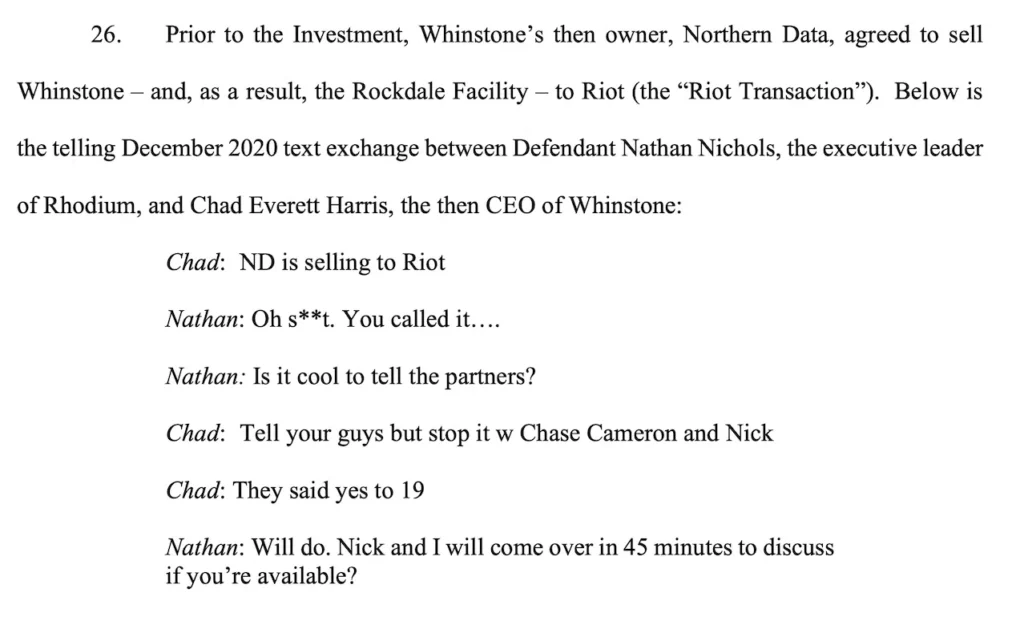In a significant development within the Bitcoin mining sector, Rhodium Enterprises has completed the sale of its Temple mine in Texas for $40.6 million in cash, coinciding with the announced resignation of co-CEO Nathan Nichols.
The leadership transition, scheduled to take effect after the New Year, comes amid serious challenges for the company, including a recent lawsuit filed by creditors against Nichols and other co-founders alleging fraud.

The company’s financial restructuring efforts have shown some progress, with Rhodium receiving $15 million of a $30 million debtor-in-possession financing from Galaxy Digital.
Following the Temple mine sale on December 18, the company utilized $16 million to fully settle its debt with Galaxy, including all associated fees and interest.
Furthermore, Rhodium has announced plans to reinstate its mining hosting contract at Riot’s Rockdale facility after claiming a legal victory against the hosting provider.
Rhodium’s Bankruptcy Context and Financial Position
The recent developments follow Rhodium’s Chapter 11 bankruptcy filing in August 2023, which revealed significant financial challenges for the company.
The bankruptcy filing, submitted to the U.S. Bankruptcy Court for the Southern District of Texas, included six subsidiaries: Rhodium Encore, Jordan HPC, Rhodium JV, Rhodium 2.0, Rhodium 10MW, and Rhodium 30MW.
The filing disclosed debts ranging between $50 million and $100 million, while total assets were estimated between $100 million and $500 million.
The company’s financial difficulties were primarily attributed to the deterioration of its relationship with Riot since 2023 and subsequent loan defaults.
Most of Rhodium’s mining operations were concentrated at Riot’s Whinstone factory in Rockdale, Texas, with the remainder at its now-sold Temple facility.
Also Read: Bitcoin Mining Giants Reveal Q3 Earnings, Total BTC Holdings Reach 12,898
Major Industry Investments and Expansions
Despite Rhodium’s challenges, the Bitcoin mining sector is witnessing significant new investments and expansions.
NYSE-listed Cango has made a substantial investment of $256 million in Bitcoin mining hardware, securing 32 EH/s of hashrate capacity with plans for an additional 18 EH/s expansion.
The company’s performance has been notable, with 363.9 BTC mined in November, positioning it as the fifth-ranked listed Bitcoin miner by realized hashrate.
In another significant development, energy services giant Halliburton has entered the Bitcoin mining space through a strategic partnership and equity investment in 360 Energy, an oilfield bitcoin mining company, marking a notable convergence of traditional energy and cryptocurrency mining sectors.
Global Geographic Shifts in Mining Operations
The industry is experiencing notable geographic diversification, particularly in Africa. Ethiopia has emerged as a significant player, leveraging its Grand Renaissance Dam (GERD), Africa’s largest dam, for Bitcoin mining operations.
The initiative has proven highly successful, contributing 18% of the Ethiopian Electric Power Company’s (EEP) overall profits.
Ethiopia’s position in the global mining landscape has been strengthened by increased foreign investment, particularly from Chinese operators relocating following their domestic mining crackdown.
The development represents a significant shift in the global distribution of Bitcoin mining operations and highlights the growing importance of renewable energy sources in the mining industry.


